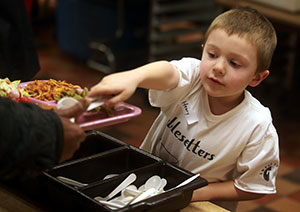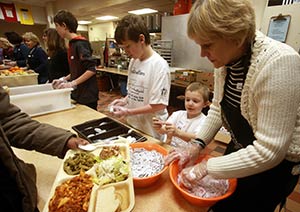A handful of Milwaukee-area Catholic schools are introducing a new method to teach children about the seven principles of Catholic Social Teaching, and to bring it to life.
 Henry Schmidt, a member of St. Francis Borgia’s Tablesetters club, passes out plastic utentils to diners at the St. Ben’s Meal Program, Milwaukee. The club introduces students in kindergarten through eighth grade to the seven principles of Catholic Social Teaching. Through a club called “Tablesetters,” students are going beyond principles taught in their schools with the belief that all are called to imitate Jesus’ call to live the Beatitudes.
Henry Schmidt, a member of St. Francis Borgia’s Tablesetters club, passes out plastic utentils to diners at the St. Ben’s Meal Program, Milwaukee. The club introduces students in kindergarten through eighth grade to the seven principles of Catholic Social Teaching. Through a club called “Tablesetters,” students are going beyond principles taught in their schools with the belief that all are called to imitate Jesus’ call to live the Beatitudes.
Started in 2005 at St. Francis Borgia School, Cedarburg, by religion teacher and archdiocesan world mission educator Anne Haines, the program grew out of the 2002 U.S. Conference of Catholic Bishops’ pastoral reflection, “A Place at the Table.” According to Haines, it stressed the idea that all God’s children deserve a “place at the table.”
“Hence, we are called to metaphorically set this table,” said Haines, a theology instructor at Pius XI High School. “However, it was the words of Peter Maurin, co-founder of the Catholic Worker Movement, which truly captured the essence of why the Tablesetters program was formed. He beckoned Dorothy Day to ‘blow the dynamite of the church’ with regards to bringing the social encyclicals to the laity.”
Haines explained the idea of the Tablesetters rose from the thought that if the adult laity needs to learn about the rich treasure of Catholic Social Teaching, then bringing it to the youngest while their hearts are on fire with a love of Jesus
| For more information on The Tablesetters Contact Anne Haines Tablesetter Facilitator thetablesetters@gmail.com |
and for others might be a good idea as well.
“Additionally, it was thought that by doing this we can increase our chance to capture our children’s imaginations and keep them in the church when they head to high schools and colleges,” she said. “After all, the Catholic Church has been doing what youth dominated organizations like ‘One’ (a campaigning and advocacy organization co-founded by Bono) is doing, but for over 100 years longer through its encyclicals, and into antiquity in its practice.”
The club, open to elementary students from kindergarten through eighth grade, is thriving at St. Francis Borgia, and growing at St. Alphonsus, Greendale. The Tablesetters Club is or has been part of the Catholic mission at St. Gabriel, Hubertus; St. Mary, Mayville; and Catholic East Elementary, Milwaukee.
“In the arena of secondary education, Messmer High School launched a very successful Tablesetters initiative last year and is currently gearing up once again to re-launch due to transition,” said Haines. “It would be such a blessing if this movement could grow and become a part of many, many schools. If it is God’s will, it will happen.”
This is the third year parent volunteer Nicole Monet has served as coordinator of the Tablesetters Program at St Francis Borgia. Four other parents assist her with planning, supervision and coordinating meetings and outreaches for approximately 30 student members.
“Ms. (Faith) Stecker, the upper school religion teacher, has been quite involved and frequently coordinates outreaches  Eddie Schmidt, 12, left, Henry Schmidt, 5, and Mary Skanavis pass out plastic utensils and salt and pepper at the St. Ben’s Meal Program, Milwaukee, on Jan. 19. Members of the Tablesetters club from St. Francis Borgia Parish, Cedarburg, regularly help out at the meal program. (Catholic Herald Family photos by Allen Fredrickson)that involve her students during the school day,” she said. “For example, she and her students have put together over 100 plates of cookies and made Christmas cards for St. Ben’s (Meal Program) for several years now. She is starting an upper school version of the Tablesetters that will do outreaches during the school day because we struggle with getting the upper school kids to meet after school. Most of them have conflicts with sports and other afterschool activities, so this will allow our older kids to continue to be involved.”
Eddie Schmidt, 12, left, Henry Schmidt, 5, and Mary Skanavis pass out plastic utensils and salt and pepper at the St. Ben’s Meal Program, Milwaukee, on Jan. 19. Members of the Tablesetters club from St. Francis Borgia Parish, Cedarburg, regularly help out at the meal program. (Catholic Herald Family photos by Allen Fredrickson)that involve her students during the school day,” she said. “For example, she and her students have put together over 100 plates of cookies and made Christmas cards for St. Ben’s (Meal Program) for several years now. She is starting an upper school version of the Tablesetters that will do outreaches during the school day because we struggle with getting the upper school kids to meet after school. Most of them have conflicts with sports and other afterschool activities, so this will allow our older kids to continue to be involved.”
With the assistance of parent volunteers, Monet plans meetings and outreaches that demonstrate the Catholic Social Teaching principles of life and dignity of the human person, call to family, community and participation, option for the poor and vulnerable, dignity of work and the rights of workers, solidarity and the care for God’s creation.
“We discuss the principles and how these outreaches allow us to live out the Gospel and help us to ‘be Jesus.’ Then we put the principles into practice,” Monet said. “For example, at our February meeting, we will make Valentine’s Day cards. We will also be making peanut butter and jelly sandwiches and assembling bag lunches. All these will be distributed to the Cathedral Center, a shelter for women and children who are homeless.”
While teaching the Catholic social principles is important, Monet admitted children have a difficult time understanding them, and the outreaches make the lessons tangible.
“We talk about the smiles we’ve brought to people, how happy people are when we do the things we do, and how this is what Jesus would do if he were here on earth,” she said. “This year we’ve also been talking about Pope Francis a lot and his love of Catholic Social Teaching. The kids really seem to relate to him.”
The St. Alphonsus Tablesetters group is modeled after the St. Francis Borgia group. School principal Pat Wadzinski approached teachers about beginning a club of their own. After research and discussion, Spanish teacher Rebecca Trojan and music teacher Kathy Clark began the group in February 2011.
“We started with approximately 25 children and now have grown to 70 or more children in grades three-seven,” said Clark. “We meet the first week of every month and pray, sing, snack and discuss how our service will reflect the Catholic social justice teachings.”
Club members have collected food and baby items for the St. Alphonsus food pantry, served at parish fish fries, donated 1,800 books to a pediatric clinic in North Dakota, prayed for and made gifts for the retired School Sisters of St. Francis, beautified the school courtyard by building and maintaining a shade garden, and more.
“As teachers, we are always impressed by the excitement and exuberance of the children when they begin the projects,” said Clark. “They are willing to help so many people with their time and talents. The students have been developing their ‘heartset of service’ over the years, and we see the growth in many of the older children as they are able to develop and execute projects with little help from the moderators. Parents have told us how grateful they are to have a club where children are encouraged to give rather than take.”
Reaching out through the principles of Catholic Social Teaching combines the richness of Catholic education and teaches children to be builders of the Kingdom of God, explained Haines.
“If we fail in this, we might as well close up shop, so to speak,” she said. “I truly believe that we do our children a huge disservice if we fail to do this in a very intentional way. Whether or not this is accomplished through Tablesetters is irrelevant. This program is just a way to do this that is already in existence, easy to implement, and, quite honestly, brings great joy. When intentional ties are made at school and at meetings between how the Eucharist nourishes us to do the work we are called to do, its power increases all the more.”
